Summary 
A strong outdoor production bravely staged in a constant light rainfall. Ragged witches and pagan circle-rituals imbue a traditional approach, well-directed with Duncan doubled as the Porter and an eerie banquet scene with a bloody Banquo standing atop a table to point an accusing finger at his murderer.
Design
Directed by Robert Quinlan. Costume design by Sandy Childers. Scenic design by Fred M. Duer. Lighting design by Sarah EC Maines. Sound design and musical compositions by Shannon O'Neill.
Cast
Wendy Robie (Weird Sister), Amanda Catania (Weird Sister), Eva Balistrieri (Weird Sister), Thomas Anthony Quinn (Duncan/Porter), Cody Proctor (Malcolm), Neal Moeller (Macbeth), Jordan Coughtry (Banquo), Kevin Rich (Ross), Lindsay Smiling (Macduff), Nisi Sturgis (Lady Macbeth).
Analysis
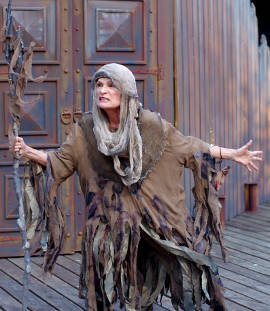
Director Robert Quinlan stages Macbeth at the Illinois Shakespeare Festival's outdoor space in the midst of a mid-July rainfall that starts at curtain and continues throughout the performance. A wooden foyer juts onto the Ewing's thrust stage, the ends of the planks broken as if in battle, two heavy doors with black brass handles on the front. Four audience members are seated on each side of the stage, and looming above the balcony and its ramp is a crossed window through which can be seen a solitary musician.
Quinlan begins with Scottish chants from approaching soldiers and then a counter-tempo from more, some moving along the ramp which spans the stage. The actor playing Macbeth proclaims the full title of the production, and the soldiers begin to wage combat in the rainfall as the musician pounds martial drums, all suddenly stopping in silent freeze-frame as a center-stage trap opens 1.1. The percussionist provides a drum roll as the opened trap reveals eerie white light and voluminous stage fog, and three craggy Witches emerge as if from hell - "when shall we three meet again?" - one gesturing ironically to the sky: "or in rain?" All three, their faces concealed by gauze, creep about the stage, staring at the motionless Macbeth, and when they close the trap door, the fighting and music resumes.
Duncan, in golden crown and red robe, is informed of Macbeth's exploits 1.2 to a timpani score, and the Witches reappear 1.3, chanting in harmony and walking in circles, sprawling across the stage, then hissing as Macbeth and Banquo arrive and draw their swords. The Witches make their prophesies and exit, each taking a different route from the stage, leaving the soldiers in confused wonder, Macbeth a chesty black-bearded general with expressive eyes, Banquo a long-haired almost-rock-star dressed all in black. When Neal Moeller's earnest Macbeth soliloquizes, he implores the audience to understand, speaking directly to the front rows, pacing back and forth downstage. His fellow soldiers chant his name when he is honored 1.4 before the King Duncan procession, and he kneels before being embraced by the thankful King. When Malcolm is named heir to the throne, it is Moeller's Macbeth that leads the applause, and his subsequent soliloquy seems more disappointment than jealousy or injury.
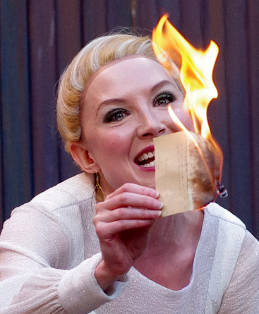
Nisi Sturgis plays Lady Macbeth 1.5 as more cruel than her husband - "unsex me here" - as she kneels in prayer - "make thick my blood" - and ritualistically burns the letter from him. Sturgis's Lady, her blonde hair tightly pinned up, is a seductress, nearly one of the witches herself, holding the candle up to Macbeth once he arrives, then circling him as if casting a spell. She shows an ability to deceive 1.6, suddenly smiling to greet the imposing Macduff - big, black, bald, and bearded - and Banquo, who swings Fleance by his arms in a playful circle.
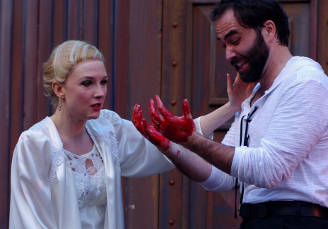
The 1.7 hesitation of Moeller's Macbeth seems natural - Duncan is his guest, his kinsman, and his King - and he simply does not have murder in him (yet), but Sturgis's Lady certainly does. She follows him, laughing with the party-goers, then slamming the door like a shrewish wife, her face pinched as she glares, a hand on a hip. He can only growl in self-defense, but Lady Macbeth wears him down, stroking his hair then leading him upstage to the celebration, their laughter forced and fake as ominous bells begin to toll. Moeller's next soliloquy is given from atop the foyer, after an embrace of Fleance that is like a clinging to humanity, torches flickering in the still constant fall of rain, and he stands alone 2.1 in near darkness: "is this a dagger which I see before me?" He descends 2.2 with the blood of the King all over his white shirt and covering his hands - "I have done the deed" - and when he reacts with fear to noises above - "amen stuck in my throat" - his Lady almost spits her disgust at him: "infirm of purpose!"
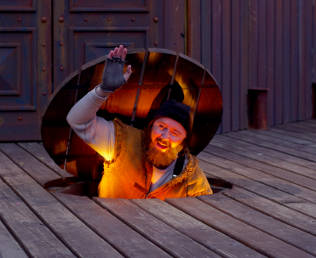
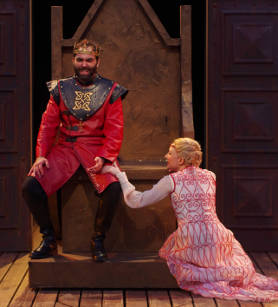
Quinlan makes a smart choice in doubling Thomas Anthony Quinn as both Duncan and the Porter. Quinn is a gifted comic actor, sitting as the Porter 2.3 on the edge of the stage to chat with the audience before finding his goblet - "hello!" - then lurching up an aisle - "there's an equivocator" - to respond to Macduff's knocking. When Moeller's already nervous Macbeth arrives onstage to the alarum, he is visibly startled by the Porter and his ghostly resemblance to the King he has just murdered. Lady Macbeth feigns a faint - "o alas, in our house?" - as Banquo almost subconsciously pulls Fleance closer to him and farther away from Macbeth. The percussion score is another wise choice by Quinlan, the drumbeats adding to the martial and ominous mood, as when the crowned Macbeth and Lady - she in a white gown with red piping like arterial blood splatter - take the thrones and scarlet banners are unfurled along the high walls of the stage. The banners, pointedly, are frayed and torn at their edges, much like the Witches' robes. When Macbeth urges his kneeling Lady to rise 3.1, all applaud, but she seems surprised to be dismissed as Moeller's Macbeth sits uncomfortably at the edge of the throne, wielding his barren scepter - "to be safely thus" - and wearing his fruitless crown. In 3.2 the Lady kneels to implore him - "why do you keep alone?" - and his response is a seething "full of scorpions is my mind" that seems desperate and nearly pitiful. Moeller's Macbeth grabs her hand so roughly that she recoils from him in fear, and when he exits, Sturgis's Lady puts a hand to her mouth at the thought of horrors yet to come.
The 3.3 banquet and murder of Banquo represent a turning point for Moeller's Macbeth and is the most effective scene of the production. A large round feasting table is built center stage by a rain-drenched crew then set with goblets and stools, and as the smiling new King and Queen emerge from upstage to greet their guests, Banquo and Fleance are beset above by three murderers. As Moeller's Macbeth descends from a private conference with one of the assassins, the guests drink toasts and shout in celebration while a hunched and bloody Banquo emerges from a trap concealed under the table to take the King's place. Moeller's Macbeth cries out, and Banquo stands and points an accusing finger, then climbs atop the table to menace him. Lady Macbeth seethes with her old disgust - "are you a man?" - but shows the guests just an eye-rolling smile, and Banquo re-emerges to pursue Macbeth in a circle around the table that recalls the Witches and their spell casting. Macbeth climbs atop the table to escape, and kneeling there, eerily under lit, he acknowledges his fate - "blood will have blood" - and moves away from the Lady's reaching hand to bring intermission.
The Festival's black-clad stage crew uses rags and long-handled squeegees to attempt to dry the stage, but rain continues to steadily fall, and the stalwart audience, now soaked, some using opened programs like paper tents over their heads for some protection, gives the crew an appreciative round of applause. The stage crew must return again before Act 5 in an impromptu second intermission, the general manager of the Festival advising the audience the stage must be as dry as possible for the safety of the performers. 4.1 features the return of the ghoulish Witches - "something wicked this way comes" - tossing gross ingredients into the yellow flickering light and fog from an opened trap. A parade of visions taunt Macbeth - Macduff not of woman born, the childless Lady, the future monarch Fleance - and at the cry of "show!" Banquo appears above, silhouetted against the musician's window. The Witches encircle Macbeth, joining their hands to restrain him as an array of shadowy crowned Kings, all under lit in yellow, emerge and take positions onstage and along the ramp below Banquo. Moeller's Macbeth breaks free and rushes to the top of the foyer - "no more sights!" - spitting in horror at what he has seen.
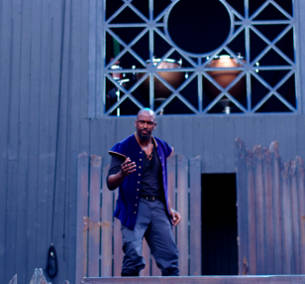
The gruesome 4.2 scene in Macduff's home - a boy playing with blocks, a baby (obviously a doll) in a bassinet - concludes with the boy stabbed, the doll's head jerked violently with an audible crack, and Lady Macduff hauled screaming and kicking from the stage. Macduff is given the news of his family, and the scene is well played, Macduff cringing as if physically struck - "I must feel it as a man" - but rising with the growing anger of a hero. 5.1 is enacted amid guitar strums, as Sturgis's mad Lady, in a ghostly white nightgown, her hair now down around her shoulders, clutches a candle and sleepwalks to the top of the foyer. She leans far over the edge, lit only from the stage, and mimes trying to wash her hands clean, and she jerks as if hearing noises, stops and stares at nothing, then sings a song and screams in sudden terror. Sturgis's Lady rushes to the stage - "what's done cannot be undone" - her guilt and madness apparent to the doctor and attendant.
The conclusion plays with Moeller's Macbeth almost resigned to his fate. He sits twisted upon the throne 5.3, enduring more reports of disloyal thanes and bearing the news from the doctor about his wife's insanity: "cure her of that." After Malcolm's soldiers gather branches 5.4 for the "moving" of Birnam Wood, Macbeth hears an offstage scream from his wife - "I have supped full with horrors" - and he sags to sit on the stage itself, almost defeated already: "tomorrow and tomorrow and tomorrow." When Malcolm and his soldiers arrive 5.6, they bang their weapons and armor onstage so the long red banners fall from their moorings, and the combat is waged in freeze-framed still shots, stuttering in stop-and-go motion, with Moeller's Macbeth fighting at center stage. When he is confronted 5.8 by Macduff, the other soldiers clear away, and as they fight the tempo of the pounding drums increases as the struggle shifts stage left then into the darkness upstage. When Malcolm declares victory 5.9, Macduff emerges above with the white-faced head of Macbeth impaled upon a long pike, and with Fleance at his side, he falls to his knees at "hail King!" The Scottish chants are sung again, and in a chilling final image from Quinlan, the Witches crowd into the musician's window to observe.